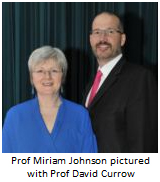 Prof Miriam Johnson, Professor of Palliative Medicine, Hull York Medical School, has been awarded the 2015 RCPE/Winston Churchill Memorial Trust Travelling Fellowship. The College jointly funds this award which is restricted to doctors applying on health related topics, and Prof Johnson will be examining “Better Research, Better Palliative Care for People with Disabling Breathlessness”. The purpose of this unique opportunity is to support a doctor to undertake a short study tour or visit a centre of excellence or innovation to develop their own thinking and enhance effectiveness in the UK.
Prof Miriam Johnson, Professor of Palliative Medicine, Hull York Medical School, has been awarded the 2015 RCPE/Winston Churchill Memorial Trust Travelling Fellowship. The College jointly funds this award which is restricted to doctors applying on health related topics, and Prof Johnson will be examining “Better Research, Better Palliative Care for People with Disabling Breathlessness”. The purpose of this unique opportunity is to support a doctor to undertake a short study tour or visit a centre of excellence or innovation to develop their own thinking and enhance effectiveness in the UK.
Summary of Prof Johnson’s award-winning proposal
Breathlessness is a frightening, serious condition. When it is bad people may fear they are dying. Many live with disabling breathlessness despite treatment for the underlying medical disease. There are few palliative treatments to help breathlessness; we need better research to find better solutions. Palliative care research is hard, and many UK studies in this area are small and compared with curative research, little funding is committed to developing palliative treatments. Our research group at the Hull York Medical School is a leader in this area but we need large collaborative projects to help us get answers.
In March 2016 I will be visiting the world’s largest dedicated palliative care clinical trials unit, the Palliative Care Clinical Studies Collaborative (PaCCSC) in Australia led by Chief Investigator Professor David Currow, which is achieving large multi-centre national studies in this area. I will bring back learning about the successful components, e.g. recruitment and implementation strategies, to the UK where completed palliative care clinical trials of medication are still rare, and deepen UK led collaborator projects.
I will learn:
The knowledge and skills I gain will help me to increase the number and quality of successfully developed and well-funded, UK based but internationally collaborative trials which are needed to find better treatments for patients who live with this everyday burden.